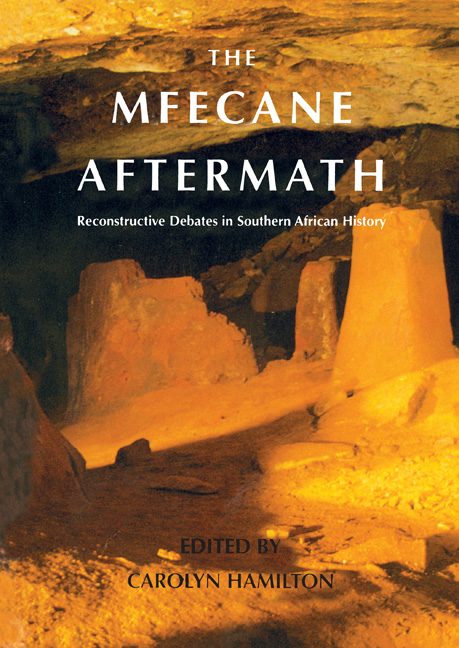Book contents
- Frontmatter
- Contents
- Maps
- Preface
- Acknowledgements
- Notes on Orthography and Names
- Contributors
- Introduction
- Part One Historiography and Methodology
- Part Two The South-Eastern Coastal Region
- Part Three The Interior
- ‘The Time of Troubles’: Difaqane in the Interior
- 11 Archaeological Indicators for Stress in the Western: Transvaal Region between the Seventeenth and Nineteenth Centuries
- 12 Prelude to Difaqane in the Interior of Southern Africa C.1600-C.1822
- 13 Conflict in the Western Highveld/Southern Kalahari c.1750-1820
- 14 ‘Hungry Wolves’: The Impact of Violence on Rolong Life, 1823-1836
- 15 The Battle of Dithakong and ‘Mfecane’ Theory
- 16 Untapped Sources: Slave Exports from Southern and Central Namibia up to c. 1850
- Glossary
- Abbreviations
- Bibliographer's Note
- Bibliography
- Complete List of Papers Presented at the Colloquium
- Index
13 - Conflict in the Western Highveld/Southern Kalahari c.1750-1820
from Part Three - The Interior
Published online by Cambridge University Press: 31 May 2019
- Frontmatter
- Contents
- Maps
- Preface
- Acknowledgements
- Notes on Orthography and Names
- Contributors
- Introduction
- Part One Historiography and Methodology
- Part Two The South-Eastern Coastal Region
- Part Three The Interior
- ‘The Time of Troubles’: Difaqane in the Interior
- 11 Archaeological Indicators for Stress in the Western: Transvaal Region between the Seventeenth and Nineteenth Centuries
- 12 Prelude to Difaqane in the Interior of Southern Africa C.1600-C.1822
- 13 Conflict in the Western Highveld/Southern Kalahari c.1750-1820
- 14 ‘Hungry Wolves’: The Impact of Violence on Rolong Life, 1823-1836
- 15 The Battle of Dithakong and ‘Mfecane’ Theory
- 16 Untapped Sources: Slave Exports from Southern and Central Namibia up to c. 1850
- Glossary
- Abbreviations
- Bibliographer's Note
- Bibliography
- Complete List of Papers Presented at the Colloquium
- Index
Summary
The intention of this essay is to establish that the period from about 1750 to 1820 was a time of conflict on the western highveld and in the adjacent southern Kalahari characterised by warfare and raiding. It should be noted that the notion of the outbreak of ‘Tswana wars’ in the late eighteenth century is not new - it was mentioned by Neil Parsons in his New History of Southern Africa (1982). This essay constitutes a fresh look at the evidence on which some of Parsons’ s conclusions were based - most notably, the ethnological surveys of Paul-Lambert Breutz. It also draws on my own research into the Hurutshe, and on theses by Leonard Ngcongco and Gary Okihiro on the Ngwaketse and Kwena. All of these works owe much to the pioneering work of Isaac Schapera, though his findings have not been exempt from critical evaluation. I attempt to reconcile and periodise oral traditions collected by Breutz, and to flesh out some economic aspects of the conflict only suggested in the works of Schapera and Ngcongco. I also refer to Legassick's innovative work on the emergence of the Sotho/Tswana.
The essay then examines the causes of the violence and offers a discussion of the processes of state-formation among these communities. Finally, this analysis is related to the re-evaluation of the difaqane initiated by Julian Cobbing. The intention is not to contest his wide-ranging critique, but rather to stress that conflict and violence engulfed regions in southern Africa other than the Natal/Zulu kingdom area where the origins of the difaqane are said to have been.
The peoples whose history is recorded here were the inhabitants of the Tswana chiefdoms (the Kgatla, Fokeng and Kwena) located in the present-day Rustenburg district and, directly to their west, the Hurutshe in the Marico, and the Ngwaketse and Kwena in the Kanye and Molepolole regions of southern Botswana. Reference will also be made to the Rolong and Tlhaping whose activities impinged on the affairs of the Hurutshe and Ngwaketse.
- Type
- Chapter
- Information
- Mfecane AftermathReconstructive Debates in Southern African History, pp. 351 - 362Publisher: Wits University PressPrint publication year: 1995



